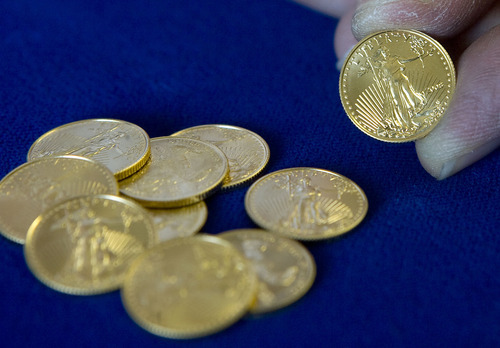This is an archived article that was published on sltrib.com in 2012, and information in the article may be outdated. It is provided only for personal research purposes and may not be reprinted.
Steve Deeds, founder of Morgan Gold, a California-based company that specializes in gold coinage,says that in a down economy many people find a hobby or investment in the precious metal content of coins.
What's the best way to get started?
Coin collecting is one of the most rewarding hobbies, but most people don't know where to begin. Is it as simple as holding onto pocket change or is it more involved? The answer is a little bit of both. If you have a jar of coins nearby that you use for laundry or parking, pick it up and drop all the coins on the desk in front of you. Rifle through them and you'll see a lot of coins a year or two old and some that may go back 30 years or more. Perhaps you may be lucky enough to find a penny from 1969, with an "S" under the date, and an amiss-looking "Liberty" next to Lincoln's head. This means you've discovered a rare Double Died Lincoln Cent, which can fetch about $35,000. Although an unlikely find, you can begin to understand where a coin collector's imagination begins. There are hundreds of ways to begin a coin collection, but a simple way to get started is by purchasing rolls of circulated wheat cents, which you can get for about $20 a pound. They were circulated throughout the 1900s and show a swath of wheat on the "tails" side. They are relatively cheap to purchase and their value continues to go up each year.
What about turning coins into cash?
People are often tempted to bring their old coins to pawn shops or other dealers. This is not always the best solution, as they typically pay only about 50 cents on the dollar. Think of coins as an investment, and hold onto them as your own central bank. However, if you have a cache of old coins and you need cash relatively quickly, research is the key. When converting coins into cash, there is nothing wrong with being your own dealer because the world is full of people who love coins as much as you do. Compare prices through eBay, read plenty of articles and stay up to date with all the prices of metals. For instance, did you know that because today's pennies are mostly made with zinc, copper is worth more than ever before? Essentially, pre-1982 pennies can get you as much as 3 cents. I got my start in the gold industry at 16 by selling coins to people in my community, so there is nothing to stop you.
How easy it is to spot a counterfeit coin?
There is no easy way but if you're making a large investment on a gold or silver coin, keep the following points in mind, and you should be safe. If your coins are certified, your dealer should present them to you in a sonically sealed holder, which makes tampering impossible. Make sure the coin has been sent to a third-party grading service, which will verify if the coin is genuine. Most coins also have a barcode on the front and a hologram on the reverse, which protects the investor and makes the gold or silver immediately liquid if he or she is required to sell.
What's the difference between investing in gold versus silver?
Gold is held by the central banks of governments around the world. In fact, governments have been buying unprecedented quantities of gold over the past decade to convert out of paper currency. This provides stability. Investors can do the same for themselves by converting out of dollar-based assets into gold, which is a global currency. Silver is more of an industrial metal, which is used in a variety of manufactured products. Therefore, it is subject to more volatility, especially as the recession in the U.S. lingers, Europe has debt problems and worldwide growth is stalled.
Dawn House
Twitter@DawnHouseTrib Steve Deeds,numismatist





